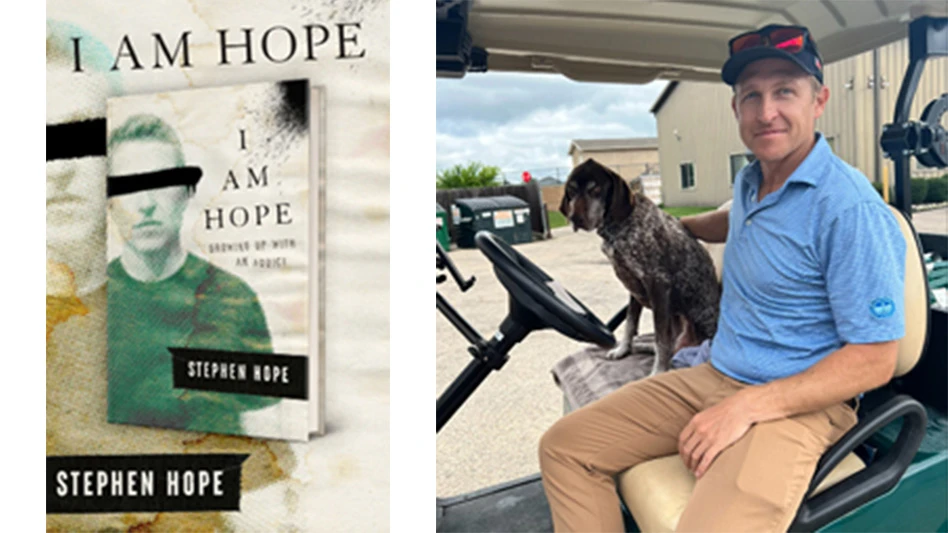
Courtesy of Stephen Hope
Stephen Hope’s life is an open book.
Quite literally.
Hope, the head superintendent of grounds and greens at The Club at Wynstone in North Barrington, Illinois, released his memoir, “I Am Hope,” earlier this year. As the title suggests, the book details the travails of an upbringing with a drug-addicted mother who was eventually arrested for cooking and dealing methamphetamine out of the author’s childhood home.
“The book is about hope, and the reason I wrote it was to help people understand what it’s like to grow up with an addict,” Hope says, “and to be able to sympathize with people who might be in that same moment in their own lives, to show them it’s not a losing battle, no matter how much it feels like it.”
Hope’s own battles and life journey are further detailed through the memoir’s taut 150 pages, ranging from significant bodily injuries to his career climb up the superintendent’s rung.
Inspired by reading about the broken father-son dynamic in David Goggins’ 2018 bestseller “Can’t Hurt Me,” Hope, a nascent author, began performing research and due diligence on “I Am Hope” as far back as 2019.
“I thought I had the material to write a book, but it then became about the ‘Why,’” Hope recalls. “And I really did and do believe that it can help people who are in the same situation that I was. I also think it can help people who are around the situation, to help them understand it more. And then, for an addict or an alcoholic, if I can get this book in their hands, maybe they can understand the damage they did or are doing to the ones they love the most.”
Hope began a regimented writing process in autumn 2020, and finished his first draft in the spring of 2021, amid his golf off-season. Two years of editing ensued, as did another year of dealing with publishing toils.
“There were a lot of different points in the process where it was, ‘Why am I doing this? Will anybody want to read this?’ And there were a lot of times I wanted to quit,” Hope says. “When we got into the deep dive of editing and moving things around, it was so overwhelming. There were all these points of, Should I just call it? Or should I keep going? I mean, I’ve got money into this project and I’m married with two kids now. But being resilient with this, working hard, seeing it through and not quitting — I don’t know, maybe I was just too stupid to quit.”
Such candor emanates from Hope’s writing style of succinct sentencing and chapters, leaving the reader with a clear sense that Hope didn’t require any ego hurdle to undress his life on the page.
“No, I didn’t,” he says. “I’m a hillbilly from Kentucky. My mom was a meth addict and I was a trailer trash kid. How can somebody strip me down more than what I am? People can call me whatever they want, but it’s probably not worse than what I am.”
The motivation of empathy for others in rough upbringings and those surrounded by substance abuse fueled the author’s process to the final page.
“Sometimes it’s more about surviving than thriving, but there are steps you can take to get through it,” Hope says. “And it is going to be a lifelong battle because, guess what, the foundation that your very being was built on is cracked. That’s just the way you were raised, and you’re gonna have to deal with that, to grow from it and to understand it.”
As for leaving any overtly sensitive out of the memoir?
“No. This is what happened,” Hope adds. “You can’t change the past.”
In the short time since the book’s spring release, the superintendent has had ample readership and reaction from friends, colleagues, employers and grounds staff.
“One of my guys, he just told me that his dad was an alcoholic and used to beat the crap out of him, so there was a real empathy there,” Hope says. “And I’m not a big person for small talk, but I love real conversations, so to get into that with an employee was great.”
Such conversations are what Hope ultimately eyes as his own greatest aim for the memoir. While he doesn’t think that, say, a sizable GCSAA seminar setting is a fit for him or his message, the author believes that intimate, one-on-one or small group connections with people in situations similar to his own can extend the written word to interpersonal bonds — and, ultimately, make a real difference in people’s lives.
Such connections have already commenced.
“I just got my first (reader) email, from a semi-retired superintendent in Florida,” Hope said in early April. “He heard me on the Beyond the Page podcast. He’s had his own life issues and he ordered the book and he wanted to schedule a call and talk to me. So far, that’s the best thing that’s happened with the book. These are the types of conversations that I’m looking forward to because my goal with this is really to help people, to show there is a light at the end of the tunnel. I hope I get more messages like that one.”
Judd Spicer is a Palm Desert, California-based writer and senior Golf Course Industry contributor.
Latest from Golf Course Industry
- From the publisher’s pen: Conscientious of a bigger role
- Bernhard and Company partners with Laguna Golf Phuket
- Terre Blanche showcases environmental stewardship
- VIDEO: Introducing our December issue
- Bernhard and Company introduces Soil Scout
- Nu-Pipe donates to GCSAA Foundation’s Centennial Campaign
- GCSAA enhances golf course BMP tool
- Melrose leadership programs sending 18 to 2026 GCSAA Conference and Trade Show





